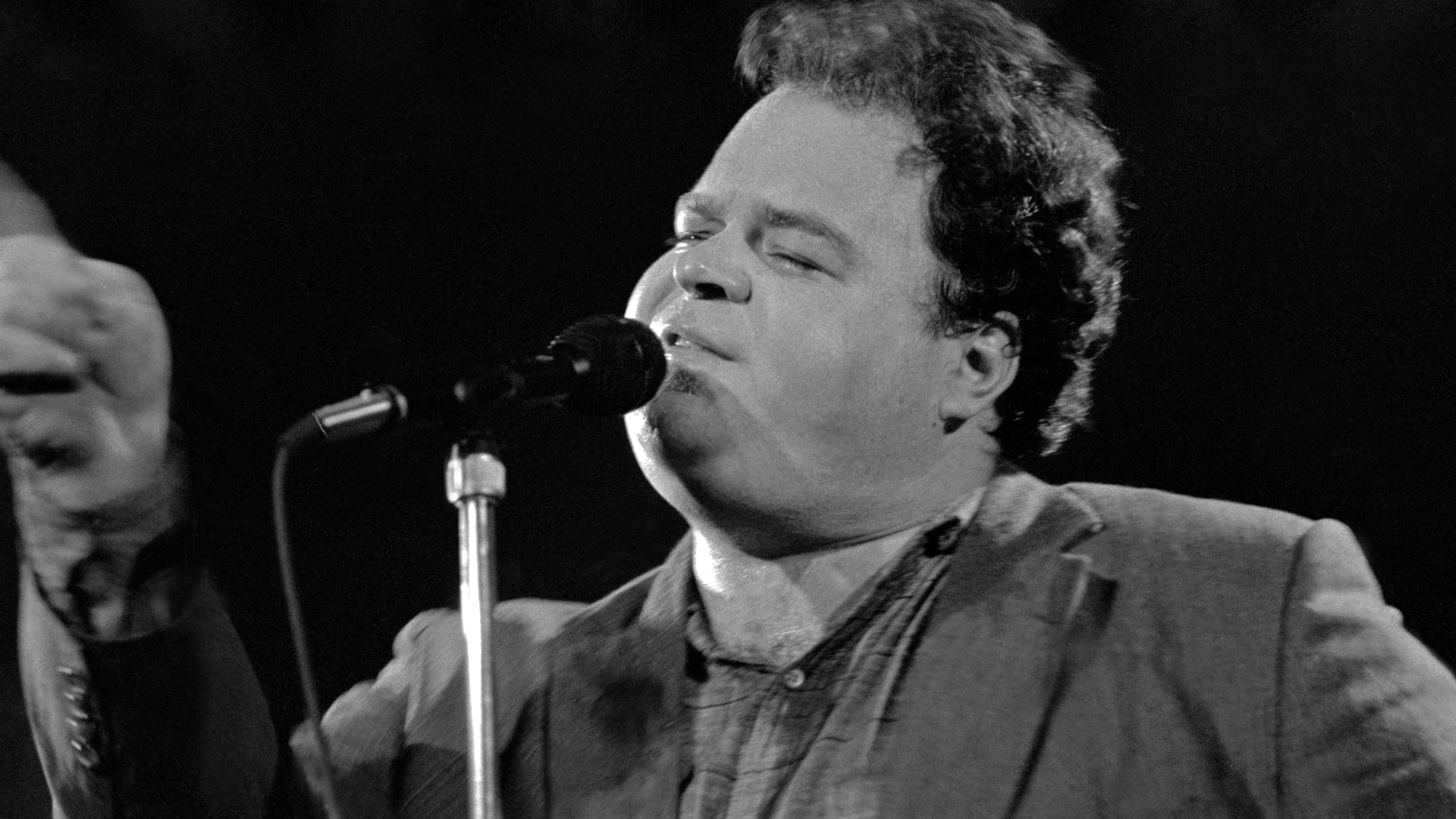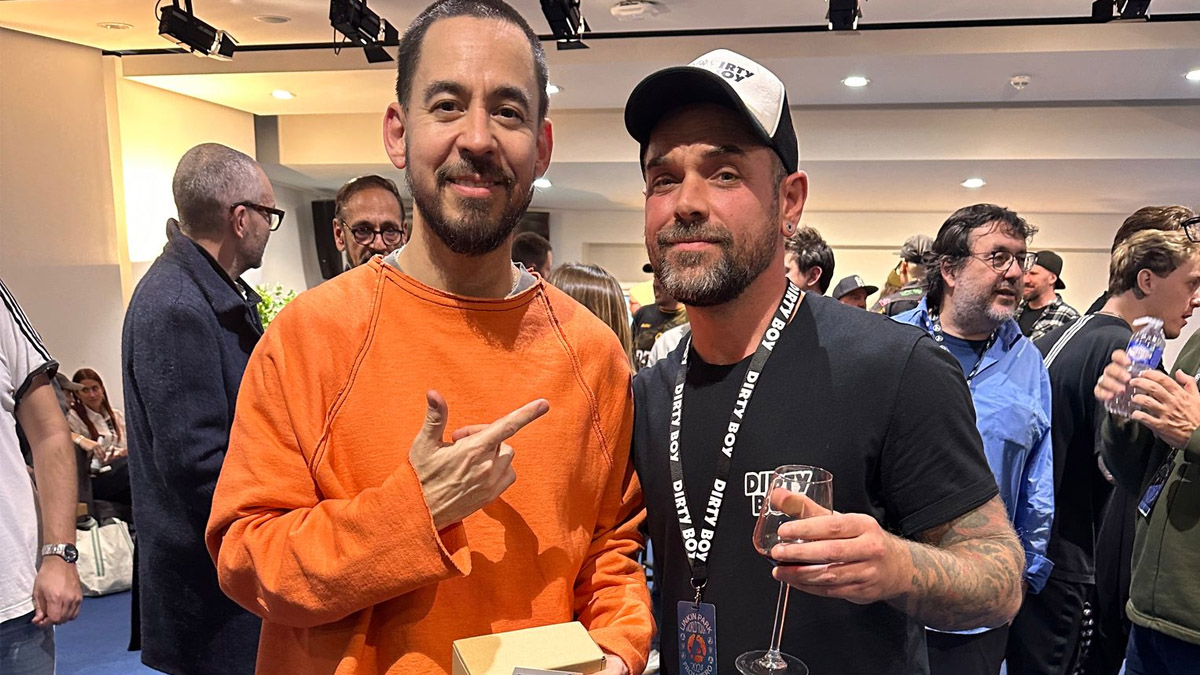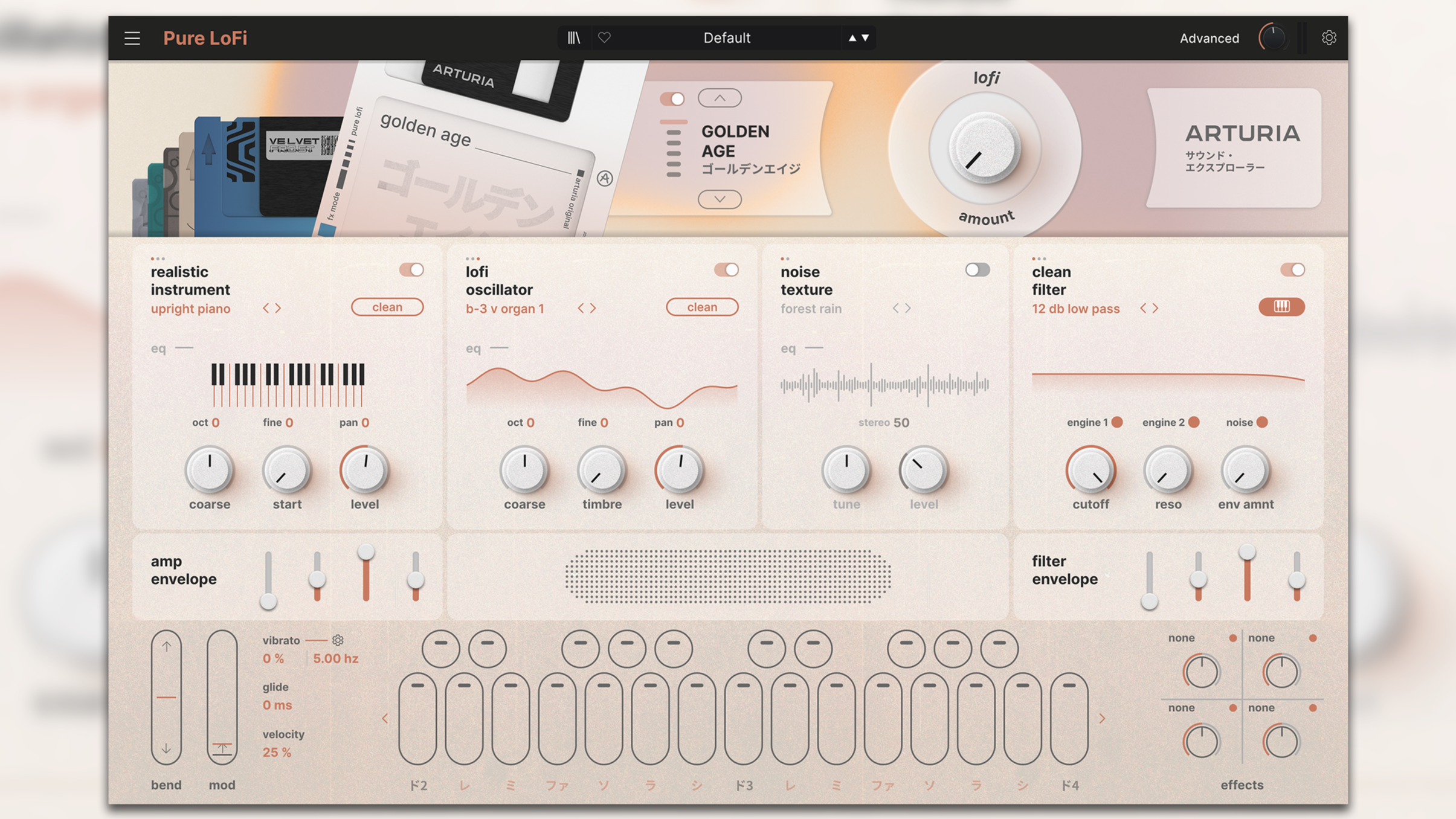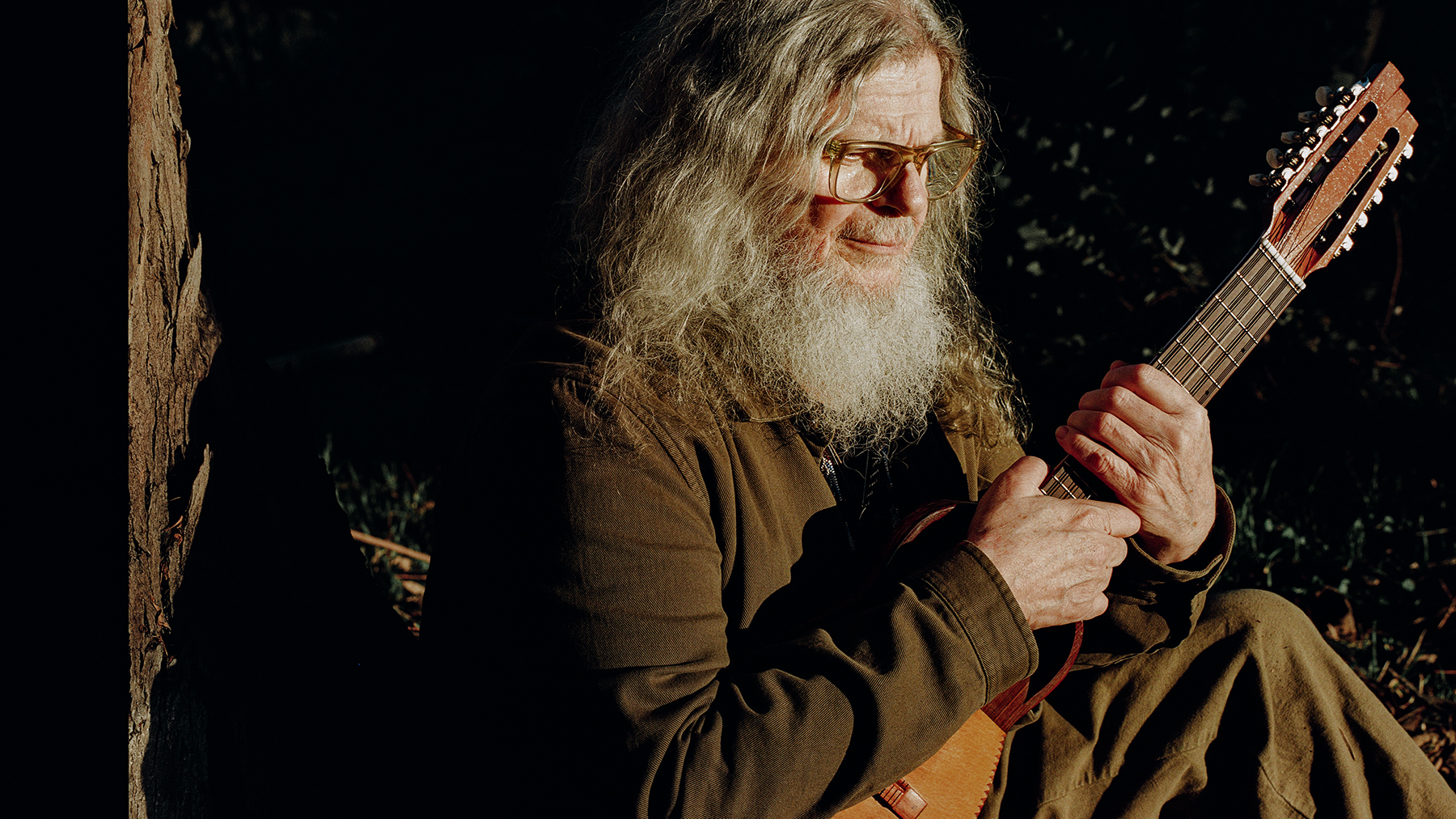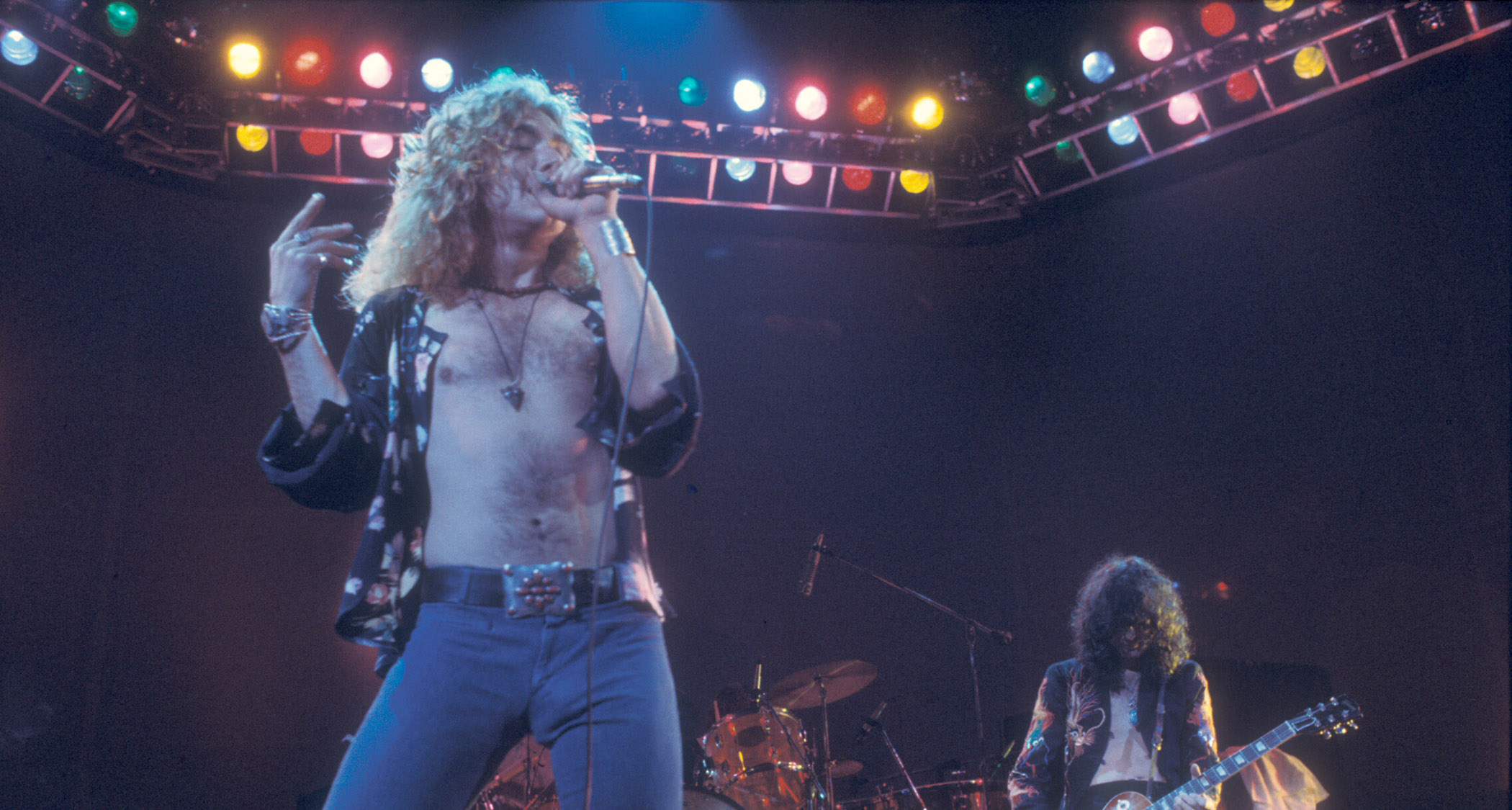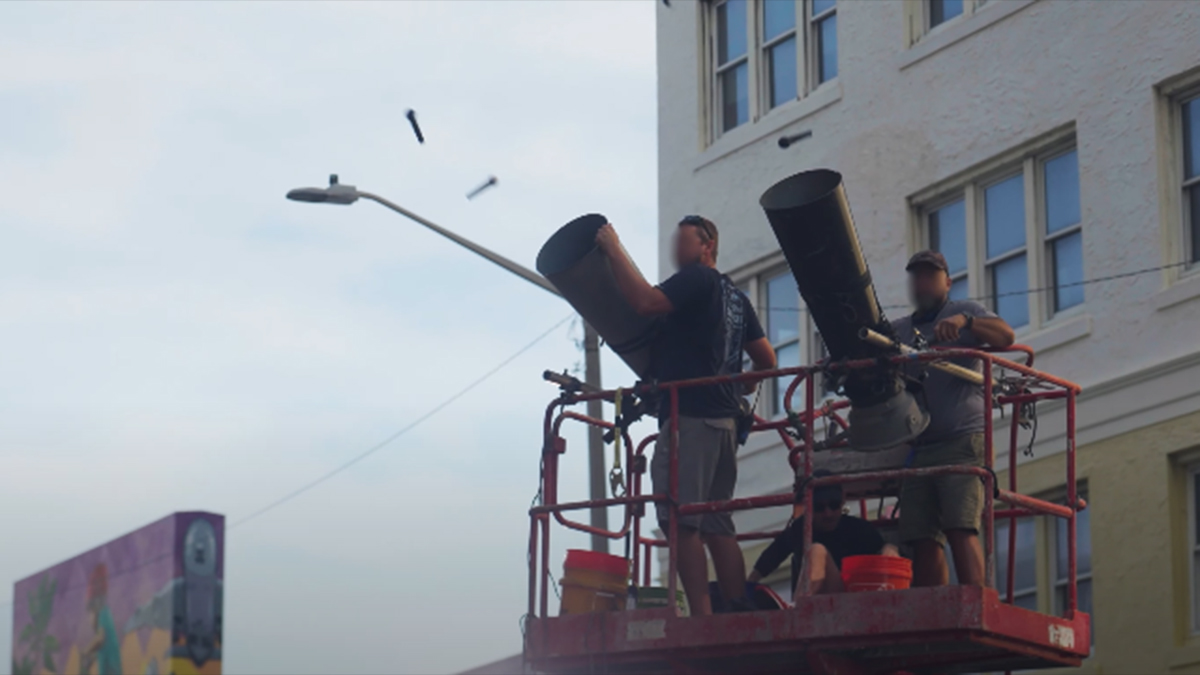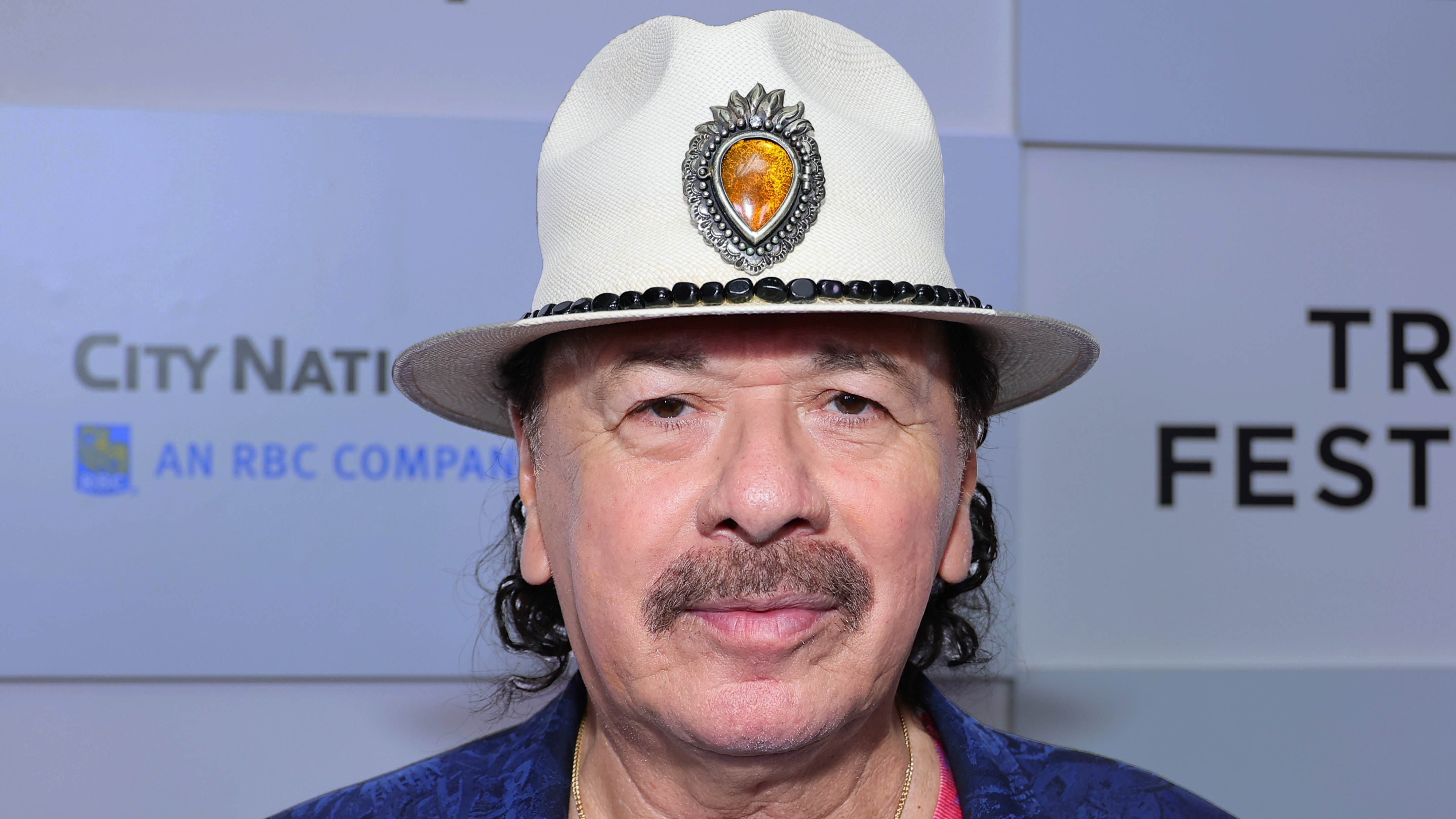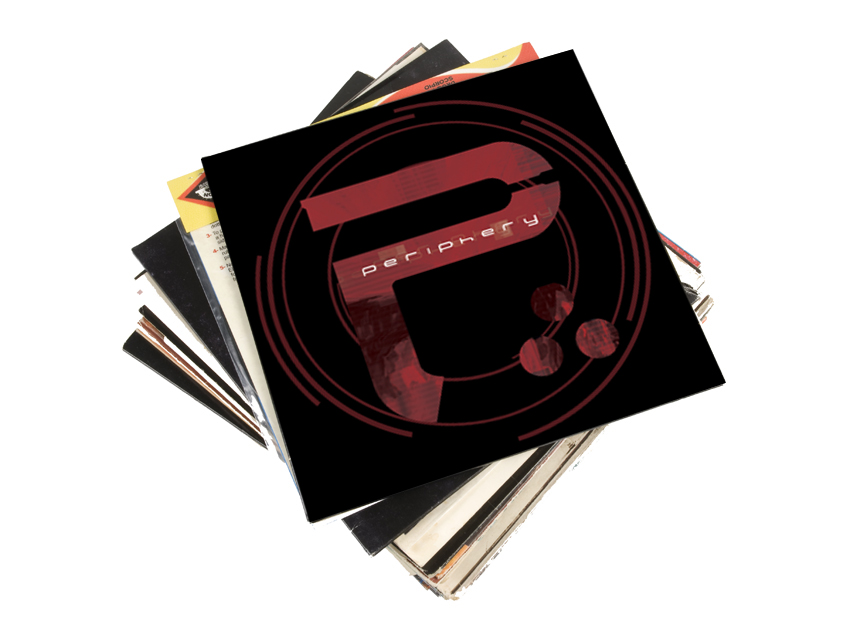
Interview: Misha Mansoor and Matt Halpern talk Periphery II track-by-track
For all of you pedants out there, Periphery's brand-new album is not called Periphery II, despite what it says on the CD cover. As guitarist Misha Mansoor explains,"Yes, it's Periphery II, but in the booklet it actually reads, ‘Periphery II: This Time It’s Personal.’
And there's a proper way to say it, too. "You have to do it in that movie voice," Mansoor says, adopting a darkly sinister tone. "'Periphery II: This Time It’s Personal.’ You have to imagine that you're pointing a gun at your arch nemesis. It's all in the attitude."
Weighing in on the elongated title, drummer Matt Halpern laughs and says, "The guys in the band are just goofballs. We like to give our songs funny titles, too. It's all in keeping with who we are."
Since they released their self-titled debut in 2010, the Maryland-based Periphery have attracted a lot of attention in progressive rock circles, and just as quickly, they've gone through some personnel changes, as well. Bassist Tom Murphy and guitarist Alex Bois have split, and the current lineup consists of singer Spencer Sotelo, guitarist Jake Bowen, guitarist Mark Holcomb, Mansoor and Halpern. (Adam "Nolly" Getgood is playing bass on tour but isn't a ful-time member.)
Although the band are viewed as pioneers of the 'djent' movement, Mansoor (who has become widely praised for his impressive guitar abilities) says that when it came time to record Periphery II, he put all such accolades out of his head. “I didn't think about any of that stuff, especially as far as I'm concerned," he says. "I’m not really a virtuoso; I have no aspirations of being a virtuoso. I know my limits. I care more about the songwriting and arranging. I’ve pushed myself in those areas, and hopefully I've stepped it up on the new album.”
Whereas the first record was essentially borne out of Mansoor's demos, this time around the band adopted a collaborative ethos. “The idea was for the whole group to have a lot more input, to present a complete picture of the band," says Halpern. "The first album was kind of thrown together. This one was us going, ‘Fuck everything. We’re going to take our time and do it right.’
“I think it defines us," he continues. "We’ve come into our own sound, at least for now. We’re going to keep growing and changing, but right now this album will show you exactly where we are. I’m pretty happy with how it turned out.”
On the following pages, Misha Mansoor and Matt Halpern talk us through Periphery II - wait, we're sorry, Periphery II: This Time It's Personal - track-by-track. The album is out now on Sumerian Records.

Muramasa
“I wrote this one a while ago with Jake," says Mansoor. "We needed a live intro for our tour, but we felt like it had to be in a specific tuning. We put it together, and Spencer had some really cool lyric ideas for it right away.
“And then what happened was, I completely forgot about the song! [laughs] When it was suggested that we use it for the album, I was like, ‘No way, that thing sucks!’ But Jake sent it to everybody, we all listened again, and I was surprised: ‘No, wait, it is pretty good. I thought it sucked, but it doesn’t.’
“It came together pretty quickly. The fact that it was a live intro made it a good opening for the album, as well as the fact that it, along with track seven, Ragnarock, and the last song, Masamune, are all linked thematically, lyrically, and they even share riffs. I think the same line that starts the album ends the album.
“The tuning is the Zyglrox tuning – AGCFAD. We have a song called Zyglrox, and that’s the tuning we have on that one. You get a really cool, big interval. For all the six-string stuff, I used either my Mayones or my Blackmachine B2. The Blackmachine B2 is my special guitar – it’s the most perfect, prized guitar.”
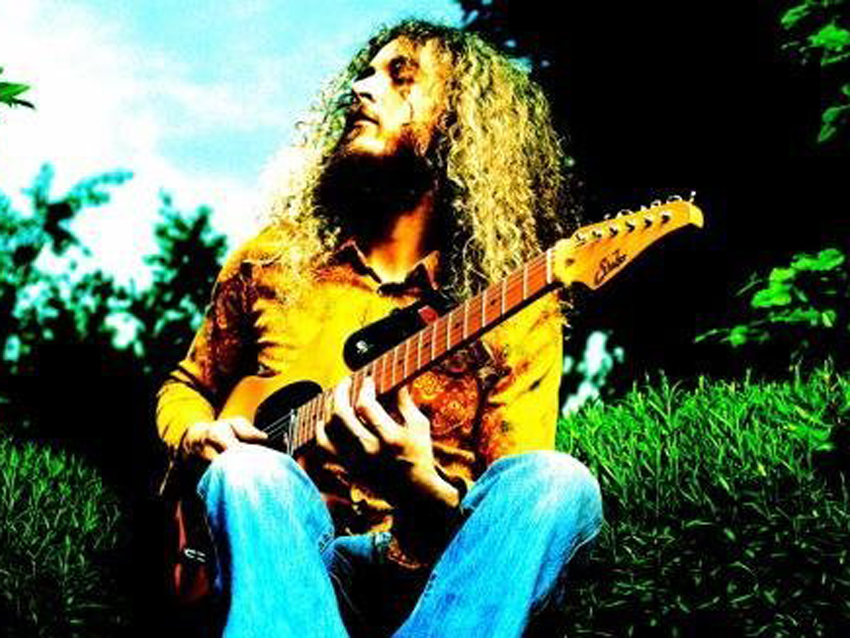
Have A Blast (featuring Guthrie Govan)
“This is an idea that I demoed a few years ago," says Mansoor. "I’ve been working on the riffs for a while. I always get a little intimidated when I have a bunch of cool riffs and I don’t know where they’re going to go because I think that I’m going to run out of ideas. That kind of happened with this song: I have a demo of it, and right around the two-minute mark it ends. I liked where it was going, but I could never breathe any more life into it. At two minutes, it’s incomplete – it’s not a song.
“Mark and Jake come over sometimes to help me work on shit, and because of them, the song came together. They contributed ideas and riffs, and now it’s happening.
“One day, I posted on Facebook that I really wanted Guthrie as a guest soloist. And this dude who works with our management, Jan Hoeglund, he’s pretty sneaky. He e-mailed Guthrie without telling me, and then he forwarded me the e-mail from Guthrie saying, ‘Sure, I’ll do it,’ as a total surprise. It was so cool.
“I e-mailed Guthrie everything he needed, but I kept getting responses from him saying, ‘Sorry I haven’t gotten to this. I’ve been so busy...’ So I thought it wasn’t going to happen. Then I was on the Dream Theater tour, and one day the solo was sent to me. It was awesome! I love his solo so much.”

Facepalm Mute
“Spencer is an amazing writer," says Halpern. "This song is one that he wrote out and demoed. A lot of people don’t know that can play so many instruments – guitar, bass, drums, keys, everything – so when he’s inspired to compose something, he can do it all himself.
“He brought the song to our attention, and we all loved it. We took what he had written and sort of elaborated on some of the parts. It’s a really high-energy song, and it’s got a great message – Spencer’s feelings about people needing to wake up and live their lives to the fullest.
“I’ve been playing it for a while, so when it came to tracking, I knew my parts perfectly. It turned out great. It remained very true to Spencer’s demo, but I definitely added some spice.”

Ji
“Misha wrote it as an instrumental," says Halpern. "It was really cool because it’s an eight-string song, so it’s got a certain sound. We all gravitated towards it and started putting our ideas together.
“It’s one of my favorites, and it shows two sides to the band – the really heavy, groovy, somewhat chaotic side, and the mature, ambient side, which you can definitely hear in the bridge.
“A fun song. It’s probably one of my favorites on the album.”
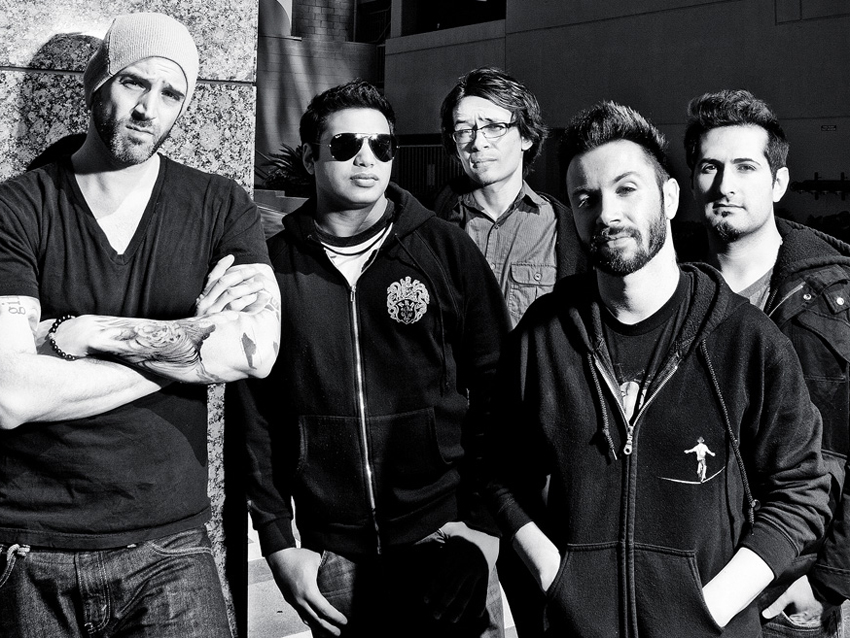
Scarlet
“This is Mark’s, and it’s pretty interesting how it came about," says Mansoor. "I have this project with him called Haunted Shores, and I showed him this really weird open tuning – I don’t even know what it is – which inspired me to write a song almost the second I heard it. Same thing with him: he heard the tuning and immediately wrote the first few riffs to Scarlet. We worked on it together and finished it up.
“Haunted Shores was supposed to be this thing where we had guest singers. Spencer wanted to try vocals on it. But then it was like, ‘Well, it’s Spencer, Mark and me – that’s three-fifths of Periphery, and it fits the album, too.’ So that’s how that happened. I think it’s an awesome track.
“It’s weird: This song is probably one of the poppiest, catchiest things on the album, but it’s actually one of the hardest to play. Just that first riff, which is Mark, the part is so crazy that it sounds like two different guitars. He’s moving around, using hammer-ons and open strings very effectively. Really cool stuff.”

Luck As A Constant
“An older song that Misha had demoed," says Halpern. "There were parts that I always enjoyed, but there were others that I wasn’t so into at first. Spencer’s vocals really tied the whole thing together. He hit the nail on the head with melodies, his attack, the way he phrases his vocals, and the message of the tune.
“The song became pretty epic; we really built it up. The last 30 seconds are incredible. Jake laid down a very tasteful guitar solo that just kicks ass. An extremely cool finish.”
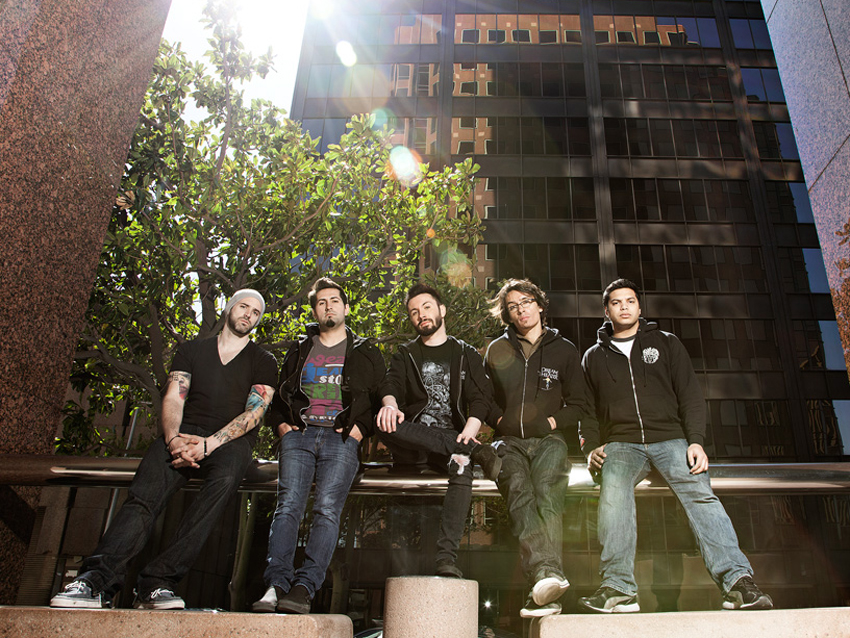
Ragnarok
“This isn’t a concept album, but Ragnarok is the next part of the concept," says Mansoor. "The tuning is interesting. We have one eight-string tuning on the album, which is Ji. My attitude is, I don’t want to use an eight-string unless I’m going to use all eight strings; otherwise, I’ll just detune a seven-string, which is what I did for Ragnarok. But what I do here is drop the seventh string, which is usually an A flat, and I put that to F#, I believe. You can get some dirty-sounding chords with this.
“It’s a kind of Jekyll and Hyde-type song. It’s mean and ugly in the beginning and really beautiful in the end. It repeats a lot of themes, and it’s a progression of the story. It’s cool.”

The Gods Must Be Crazy!
“Jake wrote this one initially," says Halpern. "It has riffs from him and Misha, although Mark may have contributed some, as well – I’m not sure. When they demoed the song, I was immediately like, ‘Yes! This has to be on the album.’
“The arrangement is pretty simple. The chorus is wide-open for the vocal melody. I remember we were touring in this big bandwagon, and Spencer was demoing the vocals right there, just screaming into his laptop. He nailed it, too. In 10 minutes, he had it down.
“The bridge has some really cool displacement grooves, and the chorus is one of my favorites on the whole record.”
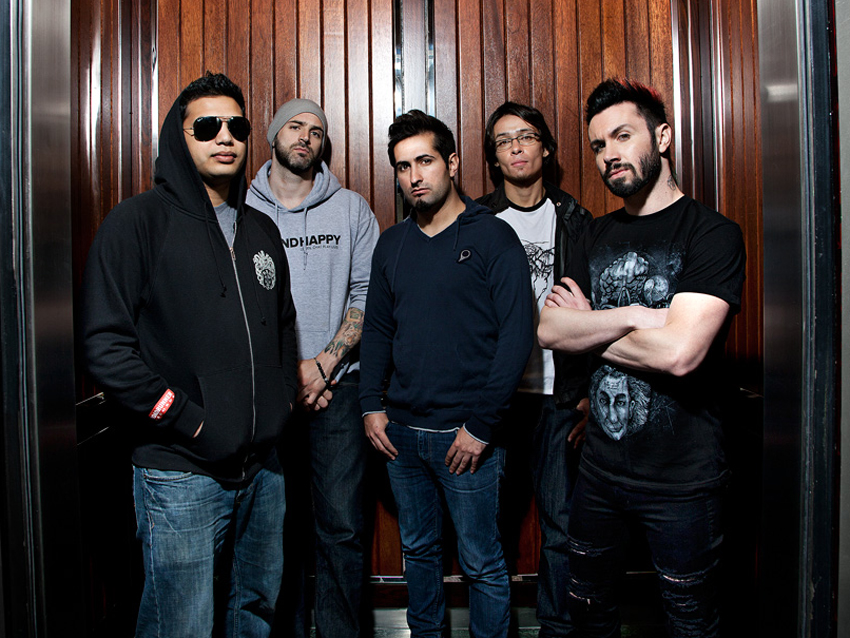
MAKE TOTAL DESTROY
“A more recent demo that Misha had put together," says Halpern. "At first, I couldn’t wrap my head around it, but the more I listened, the more I began to realize how cool it is. It’s very rhythmic; it’s got some really interesting parts that circle back. Basically, it’s a pretty pissed-off song about how the world breathes down your neck.
“From a drumming standpoint, I was very amped up about recording it. There’s so many different pieces, so many creative things going on. The energy is full-on. Definitely a highpoint for us.”
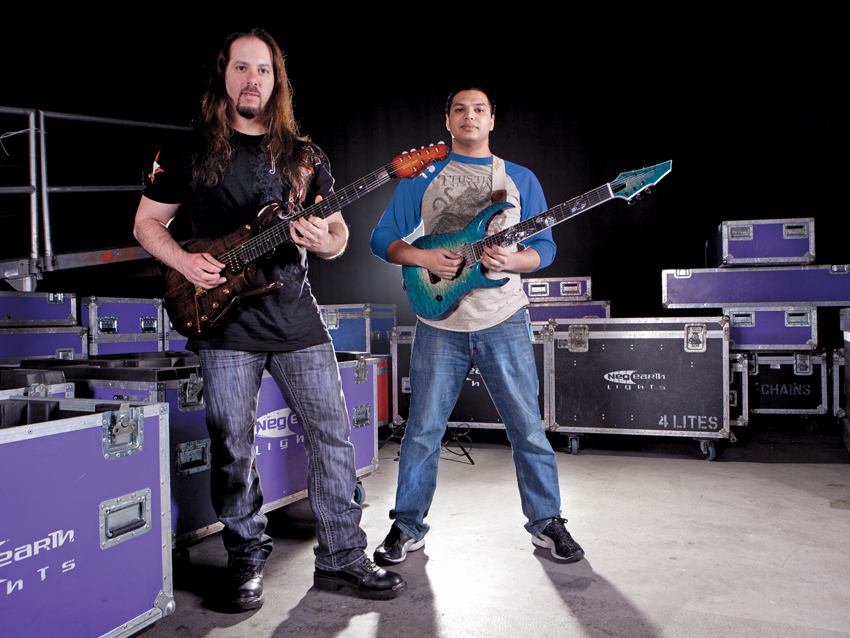
Erised (featuring John Petrucci)
“The title is a Harry Potter reference for all the nerds out there," says Mansoor. "It’s from the first book, in which the Mirror of Erised shows you the things you desire. People apparently waste away looking into this mirror instead of living life. I thought that was a pretty deep concept for a children's book. It’s like a drug.
“The song was a complete accident. My girlfriend always encourages me to play guitar at home, but I don’t feel like playing anything heavy. I just want to play pretty things. So one night I’m playing this pretty trippy thing on the Axe-Fx, with no intention at all of doing anything with it. I had about two minutes of this, and for whatever reason, it really caught the guys’ attention. They loved it. Spencer went to town with it and rearranged it for vocals; he just cut up the demo and put it all together. The chorus is really strong.
“We were on tour with Dream Theater, and we recorded John Petrucci playing a solo on the laptop that plays our backing tracks, samples and MIDI changes. I wasn’t with John when he did it, but when I heard it I was blown away. I was like, ‘Holy shit, we’ve got a Petrucci solo – and it’s incredible!
“John just did his thing. With all of the guest guitarists on the record, we didn’t tell them anything, didn’t make suggestions. We’re just thrilled that they wanted to be on our album.”

Epoch
“This is Jake’s song entirely, so I can say very little about it," says Mansoor. "But I can comment on it. He’s been doing a lot of electronic work lately, totally perfecting his craft. There’s a lot of interludes between songs that keep the sound going – Jake’s very responsible for all those, as well as the electronics on the tracks.
“We all felt it was time to put out a full-on electronic song instead of an interlude. This song is so cool, and it’s a great palette cleanser. It’s 100 percent Jake’s work. We had nothing to do with it.”

Froggin' Bullfish
“Here’s a title that explains the goofball nature of the band," says Halpern. "We had it in our repertoire for a while. It’s an awesome song, but what I really like about it is the shuffle beat. From a drumming standpoint, that’s a great groove to play.
“Spencer is at his most theatrical here. He’s using different tones to the singing, the screaming – he’s very much a storyteller. This is an aspect that I think we’re going to explore a lot more in the band.”
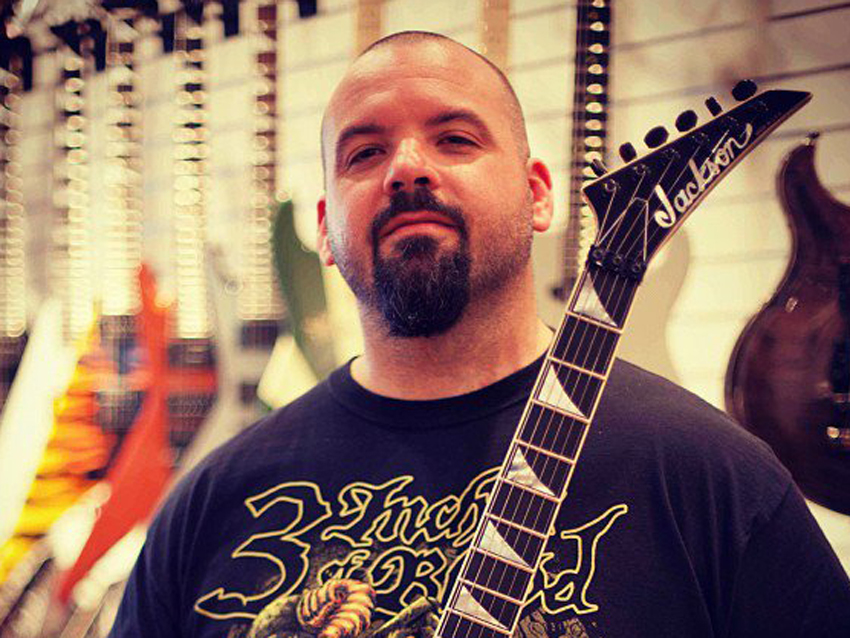
Mile Zero (featuring Wes Hauch)
“I had demoed about 50 seconds’ worth of this and put it up online," says Mansoor. "It was the middle section, and I had no idea what to do with it. It didn’t sound like the beginning of a song, it sounded like the middle. Once again, Mark had a bunch of riffs – the first two riffs in the song are his. We started vibing off of each other, put our riffs together, and before you knew it, everything made sense.
“Wes Hauch. I always said that Wes was the best guitarist that nobody’s ever heard of. He really holds a note, he’s so tasty – he’s the cleanest guitar player I’ve ever heard. He doesn’t give a shit about going off; he just wants to do stuff that sounds good. Plus, he’s a great friend of ours, so we said, ‘We’ve got to give him this opportunity because he’ll absolutely kill it, and it’ll get his name out there.'
“Since he cut the track, he’s joined The Faceless, so that’s kind of cool. Like everybody else, he emailed his part to us. 2012 – that’s the way you do it!”
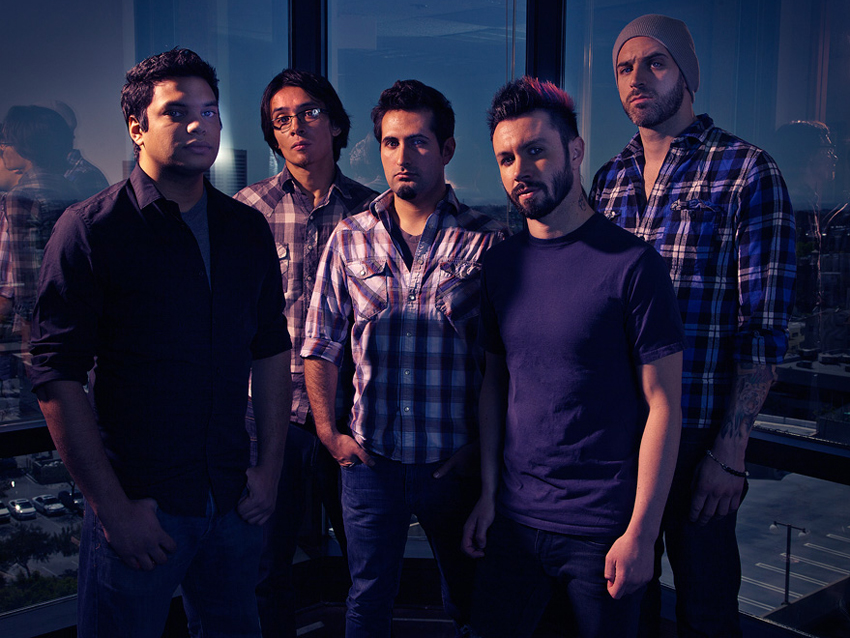
Masamune
“The last song, and it just might be my favorite on the album," says Halpern. "It’s so hard to pick favorites, though. I always loved the demo of the song – the simplicity of the grooves and the guitar parts gave me chills.
“Spencer wrote the vocals in 15 minutes, and in an hour he had everything recorded. The kid’s unbelievable, and I have to say that his singing is epic here. He’s such a talent.
“Drumming-wise, it’s pretty busy. From the middle to the ending, the goal was to create something that’s so heavy and dark and so in your face. The guys let me just go off on a drum solo in the breakdown section before it fades out, and that was a lot of fun. One take was all I needed.
“The song ends like you’re traveling out into space – you don’t know where you’re going, you’re totally screwed, and everything is a disaster. If Hell were in the sky, you’re on your way.”
Joe is a freelance journalist who has, over the past few decades, interviewed hundreds of guitarists for Guitar World, Guitar Player, MusicRadar and Classic Rock. He is also a former editor of Guitar World, contributing writer for Guitar Aficionado and VP of A&R for Island Records. He’s an enthusiastic guitarist, but he’s nowhere near the likes of the people he interviews. Surprisingly, his skills are more suited to the drums. If you need a drummer for your Beatles tribute band, look him up.
"At first the tension was unbelievable. Johnny was really cold, Dee Dee was OK but Joey was a sweetheart": The story of the Ramones' recording of Baby I Love You
"Reggae is more freeform than the blues. But more important, reggae is for everyone": Bob Marley and the Wailers' Catch a Fire, track-by-track
"At first the tension was unbelievable. Johnny was really cold, Dee Dee was OK but Joey was a sweetheart": The story of the Ramones' recording of Baby I Love You
"Reggae is more freeform than the blues. But more important, reggae is for everyone": Bob Marley and the Wailers' Catch a Fire, track-by-track

